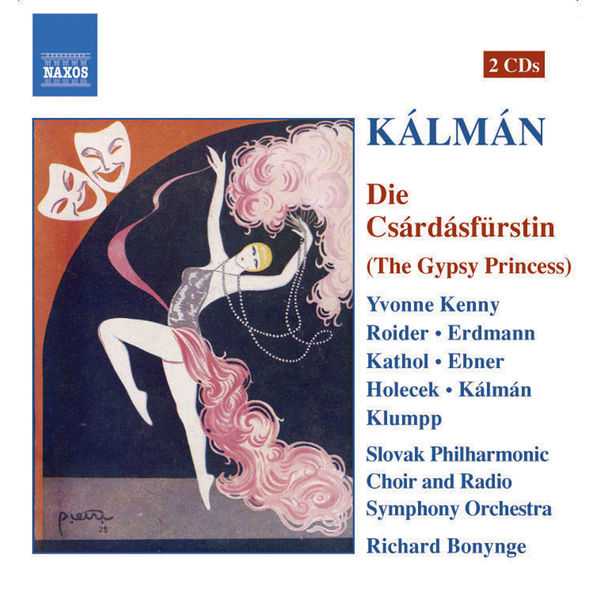

Composer: Emmerich Kálmán
Performer: Yvonne Kenny, Michael Roider, Mojca Erdmann, Karl Michael Ebner, Marko Kathol, Heinz Holecek, Hellmuth Klumpp, Yvonne Kálmán, Slovak Philharmonic Choir
Orchestra: Radio Symphony Orchestra
Conductor: Richard Bonynge
Number of Discs: 2
Format: FLAC (tracks)
Label: Naxos
Catalogue: 8660105-06
Release: 2005
Size: 1.01 GB
Recovery: +3%
Scan: yes
CD 01
Die Csárdásfürstin
01. Vorspiel
Act I
02. Lied: Heia, heia, in den Bergen ist mein Heimatland (Sylva, Boni, Feri and Chorus)
03. Marsch: Alle sind wir Sunder (Boni, Feri, 8 men)
04. Duett: Sylva, ich will nur dich (Sylva, Edwin)
05. Lied: Aus ist’s mit der Liebe (Boni, 8 women)
06. Lied: O, jag’ dem Gluck nicht nach (Sylva, Edwin, Boni, Feri)
07. Finale I: Ich, Edwin Ronald
Act II
08. Entr’akt
09. Tanzwalzer: Erstrahlen die Lichter (Chorus)
10. Schwalbenduett: Ich warte auf das grosse Wunder (Stasi, Edwin)
11. Duett: Heller Jubel (Sylva, Edwin)
CD 02
Die Csárdásfürstin
Act II
01. Quartett: Liebchen, mich reisst es (Sylva, Stasi, Edwin, Boni)
02. Duett: Madel, guck (Stasi, Boni)
03. Duett: Tanzen mochte ich (Sylva, Edwin)
04. Finale II: Das Gluck wohnt uberall
Act III
05. Intermezzo
06. Terzett: Nimm, Zigeuner, deine Geige (Sylva, Boni, Feri)
07. Duett-Reminiszenz: Madel, guck (Stasi, Boni)
08. Schlussgesang: Tausend kleine Engel (Sylva, Stasi, Edwin, Boni)
Der Zigeunerprimas, “Sari” (Sung in English)
09. Dorfkinder
10. Der Zigeunerprimas: Vive le roi
Die Faschingsfee
11. Hollaho, hollaho, wir kommen zurecht
Das Hollandweibchen (A Little Dutch Girl)
12. Lockend soll ertonen Dir ein feurig Lied
Der Teufelsreiter
13. Grand Palotas de la Reine
The English title of Kálmán’s most celebrated operetta is a misnomer. The heroine is a princess not of gypsies but (as the German title, DieCsárdásfürstin, indicates) of the csárdás; she’s a Budapest cabaret-singer in love with a young aristocrat. Its score shows Kálmán at his most fluent, with a succession of gloriously tuneful hit numbers that mix spicy Hungarian rhythms with the more graceful strains of the Viennese waltz.
Individual numbers have often been committed to disc, but complete recordings have been much less frequent. Yet to appreciate the overall structure of Kálmán’s operetta scores you really need to hear his elaborately constructed act finales, in which musical reprises are interspersed with passages of dialogue and melodrama.
Apart from sensibly reducing the opening orchestral flourishes from three to one, Bonynge typically gives us total fidelity to what Kálmán actually wrote. He brings out to the full Kálmán’s highly charged rhythms, every detail of the exotic orchestration, and the contrasts of mood between the fiery big numbers and the moments of melancholy and sadness in the Acts 1 and 2 finales. Among a wholly admirable cast, Yvonne Kenny provides the vocal strength, fire and beauty required by the title role. A wonderful bargain.
Imre Kálmán’s Die Csárdásfürstin (The Gypsy Princess) is one of the pinnacles of Viennese operetta and perhaps the only major entry in the genre to debut in the midst of World War I. References to the outside conflict within Die Csárdásfürstin are subtle, but pregnant with meaning. If Richard Strauss’ Die Rosenkavalier represents the glory of Old Vienna on the eve of her dismantling, Die Csárdásfürstin is the sound of her subsequent collapse in progress. Yet a 1999 production of Die Csárdásfürstin held by the Semper Opera in Dresden that resettled the action into the very trenches of the war was roundly condemned by critics and public alike. Without regard to the serious undertone of the work, its tragic charm, sweet waltzes, and exciting pseudo-Hungarian dances are what sell the tickets still when Die Csárdásfürstin is advertised on the marquee.
Yvonne Kenny, Michael Roider, and the Slovak Philharmonic Choir Radio Symphony Orchestra under legendary operetta specialist Richard Bonynge combine their efforts in this Naxos release of Die Csárdásfürstin with the intention of delivering the goods as promised. The singing all around is very good, and the Slovak Radio Symphony Orchestra pulls through this bouncy and deceptively difficult score admirably, though it occasionally shows signs of being winded and weary at the ends of particularly long scenes.
Complete recordings of Die Csárdásfürstin are not exactly thick on the ground, at least in non-German speaking countries. In the CD era it is possible with some trimming to squeeze a representative Die Csárdásfürstin onto a single disc. Here, Naxos has decided to put away the trimming shears and instead bring in some rare music from other never-heard Kálmán stage productions at the end of the second disc. These little filler pieces, taken from works ranging from 1917 to 1932, are completely charming and add considerable value to the two-disc set as a whole. Naxos cuts an additional corner by making the libretto accessible on its website, rather than adding extra pages to the booklet to accommodate it.



